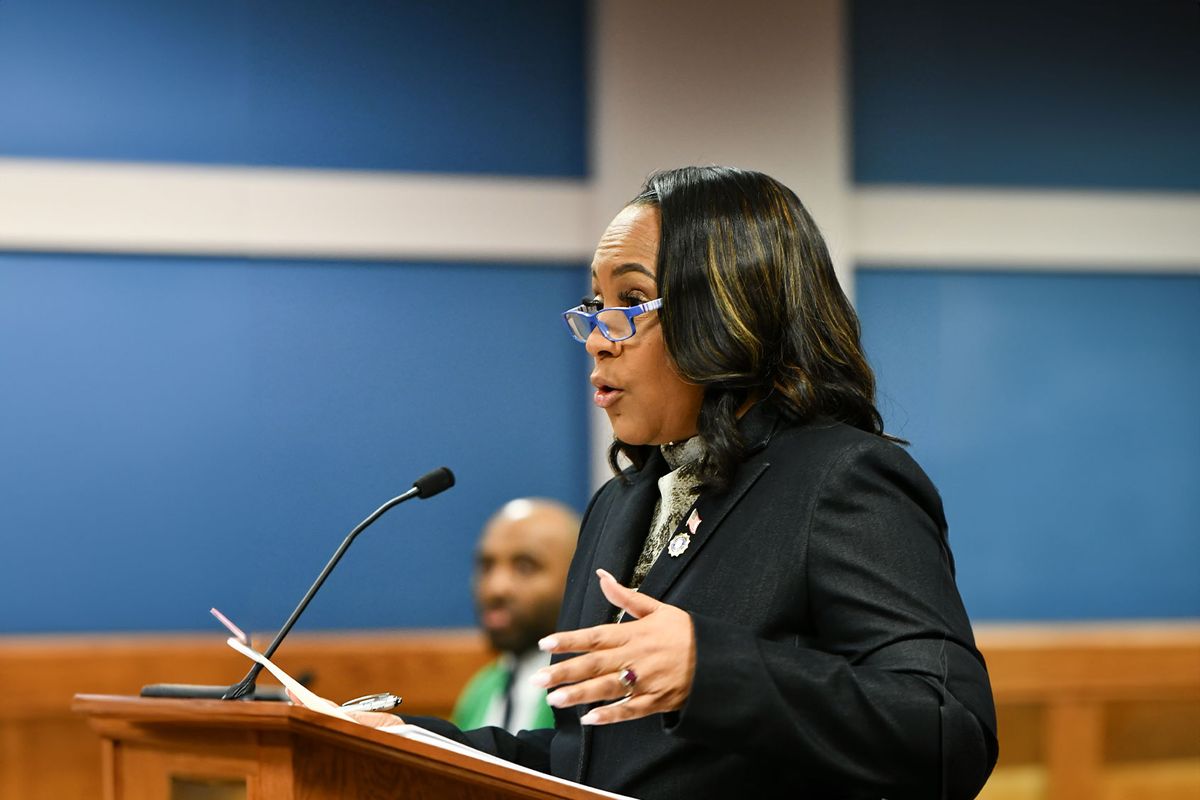Fani Willis, the DA prosecuting Donald Trump, Michael Roman and 18 co-conspirators in Georgia’s 2020 election interference case, has filed her response to Roman’s motion to disqualify and dismiss the case on the grounds that Willis and her outside counsel are having a consensual affair. There is obviously no conflict of interest.
Roman, who served as Trump’s director of election day operations, was indicted along with Trump and others on a full range of election felonies, including impersonating government officials, forgery, pressuring officials to lie, and advancing fake electors to falsify Georgia’s election results.
Roman’s motion, previously scheduled for hearing on February 15, 2024, is defeated by its own attached Exhibits, which Roman apparently failed to read. Donald Trump, whose trial counsel also seems to struggle with exhibits, has joined in Roman’s motion. Aside from defeating Roman’s motion on the face of his own exhibits, and despite all the hyped-up headlines suggesting otherwise, Willis’ response lays bare the lack of any conflict of interest created by her retention of Wade as outside counsel.
A trumped-up claim that Willis acted without county authority
Roman insists that under Georgia law, Willis was required but failed to obtain Fulton County’s approval prior to appointing Wade as special prosecutor, which means the indictment “suffers from a structural and irreparable defect and must be dismissed.”
Despite spending the bulk of real estate in his motion on the claim that Willis hired Wade without Fulton County’s permission, Roman seems to have overlooked his own exhibit C, a fully executed Fulton County Commissioner’s “Resolution authorizing funding for additional personnel for the office of Fulton County District Attorney personnel.”
We need your help to stay independent
The resolution was signed by the Fulton County commissioners on Sept. 15, 2021. It granted Willis nearly $800,000 for 2021 and $5 million for 2022 to retain more prosecutorial staff. Two months after the Fulton County commissioners authorized the additional appropriations, Willis hired Wade.
Roman argues that the county’s authority was limited to prosecuting COVID backlog cases, and suggests his and Trump’s election felonies somehow fall outside that prescribed authority. Roman is wrong. Not only were the alleged Georgia election crimes committed during the heart of COVID, but, the Fulton County’s Commissioners’ signed resolution says no fewer than four times that it was granting Willis the funds to help address Georgia’s rising crime rate, without limitation as to crime type, level, or severity. Any felony identified under Georgia’s penal code is a crime under Georgia law, including Trump on a recorded call, after he lost the election, pressuring Georgia Secretary of State Brad Raffensperger to “find” 11,780 non-existent votes.
A trumped-up motive to hire “her boyfriend”
The bottom line of the disqualification motion is that Willis hired Wade because they were involved romantically, and she wanted to benefit financially from his hourly compensation. It’s a sloppy theory.
Willis included Wade's affidavit in her filing, admitting to the consensual affair but clarifying that it started after Wade was hired. As previously revealed, Willis tried to hire two other prominent attorneys before she offered the role to Wade. Willis first asked Roy Barnes, a former Georgia governor, to serve as senior counsel in the Trump prosecution, then asked Gabe Banks, a former federal prosecutor. Both men, concerned about MAGA threats to their personal safety, declined.
Willis’ previous offers to Barnes and Banks defeat Roman’s trumped-up motive that Willis hired “her boyfriend” just because she wanted to “benefit financially” from his contract; the affidavit as to when the affair began dispels Roman’s theory that Wade and Willis were already involved when Willis retained him.
A trumped-up conflict of interest
The Roman/ Trump strategy, more PR than legal, succeeded in garnering headlines about Willis’ alleged “conflict of interest.” But, while sleeping with opposing counsel could create a conflict of interest, as could receiving a financial incentive (like a commission payment) to secure a conviction, having a consensual affair with someone on your own team, and expecting to get paid for work performed under an assigned and accepted duty, doesn’t create a conflict.
As Willis’ response outlines, under Georgia caselaw, a DA is not disqualified by personal interest in a case where he ‘was not acting … for his personal or individual interest, but in his character as an officer of the law specially charged by statute to perform this particular duty.” Wade was hired to fulfill the particular duty of pursuing a just conviction against Trump and his co-conspirators.
Expecting to get paid for work performed, like all retained counsel, is not a disqualifying “personal interest,” nor is a consensual romance.
Willis’ response questions whether Trump/ Roman’s true intent in seeking to disqualify her is to handicap a prosecutor pursuing an historically momentous case against Trump at great personal cost, because they hope to see Willis “substituted with someone less committed to do so.”
Willis’ commitment to pursuing justice in the Trump election case, despite obvious risks to her own personal safety, is one of the last remaining lines of defense against an above-the-law authoritarian threatening our democratic norms. The motion should be denied.



Shares